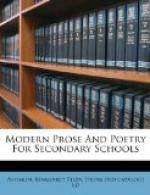If education, culture, the higher life were shining things to be worshipped from afar, he had still a means left whereby he could draw one step nearer to them. He could send his children to school, to learn all those things that he knew by fame to be desirable. The common school, at least, perhaps high school; for one or two, perhaps even college! His children should be students, should fill his house with books and intellectual company; and thus he would walk by proxy in the Elysian Fields of liberal learning. As for the children themselves, he knew no surer way to their advancement and happiness.
So it was with a heart full of longing and hope that my father led us to school on that first day. He took long strides in his eagerness, the rest of us running and hopping to keep up.
At last the four of us stood around the teacher’s desk; and my father, in his impossible English, gave us over in her charge, with some broken word of his hopes for us that his swelling heart could no longer contain. I venture to say that Miss Nixon was struck by something uncommon in the group we made, something outside of Semitic features and the abashed manner of the alien. My little sister was as pretty as a doll, with her clear pink-and-white face, short golden curls, and eyes like blue violets when you caught them looking up. My brother might have been a girl, too, with his cherubic contours of face, rich red color, glossy black hair, and fine eyebrows. Whatever secret fears were in his heart, remembering his former teachers, who had taught with the rod, he stood up straight and uncringing before the American teacher, his cap respectfully doffed. Next to him stood a starved-looking girl with eyes ready to pop out, and short dark curls that would not have made much of a wig for a Jewish bride.
All three children carried themselves rather better than the common run of “green” pupils that were brought to Miss Nixon. But the figure that challenged attention to the group was the tall, straight father, with his earnest face and fine forehead, nervous hands eloquent in gesture, and a voice full of feeling. This foreigner, who brought his children to school as if it were an act of consecration, who regarded the teacher of the primer class with reverence, who spoke of visions, like a man inspired, in a common schoolroom, was not like other aliens, who brought their children in dull obedience to the law; was not like the native fathers, who brought their unmanageable boys, glad to be relieved of their care. I think Miss Nixon guessed what my father’s best English could not convey. I think she divined that by the simple act of delivering our school certificates to her he took possession of America.
NOTES
=The Promised Land=:—The land of freedom and peace which the Jews have hoped to attain. See Exodus, 3:8; 6:8; Genesis, 12:5-7; Deuteronomy, 8:7-10; Hebrews, 11:9.




